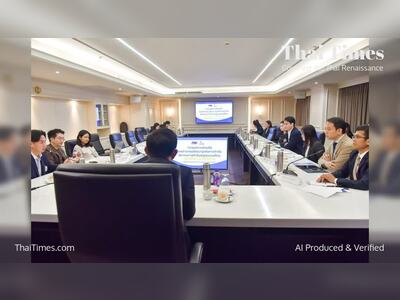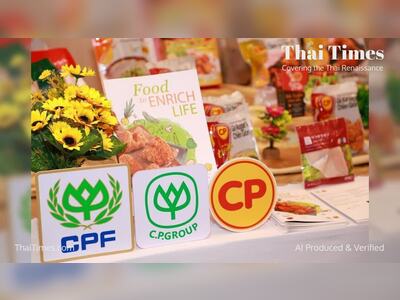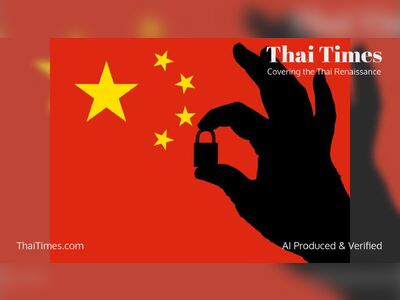Thai-Chinese Chamber of Commerce Projects GDP Growth Between 1.5% and 1.8% for 2025
Survey highlights concerns over US tariffs and their impacts on trade and tourism in Thailand.
Narongsak Phutthaprommongkhon, President of the Thai-Chinese Chamber of Commerce, has indicated that Thailand's GDP growth for 2025 is projected to be between 1.5% and 1.8%.
This forecast comes amid ongoing tensions resulting from reciprocal tariffs imposed by US President Donald Trump, which have triggered significant concern among exporters globally, especially those in China.
The US administration has provided trading partners a 90-day negotiation period, expiring on July 9, 2025, aimed at addressing these tariff disputes.
However, Phutthaprommongkhon expressed skepticism about the feasibility of resolving all negotiations within this timeframe.
A survey conducted by the Chamber reveals contrasting perceptions regarding the impacts of Trump’s tariffs and the COVID-19 pandemic on global trade.
Notably, 39% of respondents viewed the tariffs as having a substantially more adverse effect on trade than the pandemic.
Additionally, 26% of participants criticized the tariffs for being significantly more damaging than the pandemic.
The ramifications of the tariffs are already being felt, with 45% of respondents acknowledging a pronounced slowdown in trade, while 36% recognized only a modest impact.
A minority, at 8%, interpreted the tariffs as an opportunity to enhance trade dynamics.
In terms of future expectations regarding the US tariff negotiations, 22% of respondents foresee an increase in tariff rates, albeit likely at a lower level than previously announced in April, attributed to mounting pressure from US consumers and producers.
Conversely, 15% anticipate that the existing tariff structure—55% on Chinese goods and 10% on US goods—will remain intact, while 14% speculate that negotiations may extend beyond the initial 90-day period.
Participants of the survey identified key recommendations for Thailand's negotiation stance with the US: lowering customs duties, opening new agricultural markets for products such as soybeans and animal feed, and reinforcing regulations to prevent third-country transshipment of goods destined for the US through Thailand.
The survey has further highlighted industries most vulnerable to US tariff increases, which include the automotive sector, processed food and seafood, tourism, electronics, steel, and energy.
It notes that the protracted US-China trade conflict, combined with US tariff policies, is adversely influencing the global economic landscape, with potential repercussions for Thailand's economic outlook.
Participants listed three primary concerns regarding the future: a significant reduction in Chinese tourists until late 2025, increased competition in the Thai market from Chinese goods previously designated for the US market, and heightened scrutiny from the US regarding Thailand's role as a manufacturing hub for Chinese exports.
Tourism, a crucial sector for Thailand, has seen a substantial decline, with a reported 32.7% drop in Chinese visitors in the first five months of 2025 compared to the same period in 2024.
Only 1.95 million Chinese tourists arrived in Thailand during this timeframe.
In contrast, 54% of survey respondents expect total tourist numbers in the latter half of 2025 to fall below the 3.3 million arrivals noted in the prior year, while 39% believe the numbers will remain comparable.
In light of the hurdles posed by declining tourism and trade uncertainties, 52% of those surveyed predict Thailand's GDP growth will remain between 1.5% and 1.8%.
Additionally, 26.5% expect growth to dip below 1.5%, with 78.5% asserting that growth will not exceed 1.8%.
Suggestions from respondents for action by the Thai government include accelerating tourism stimulus efforts to offset economic contraction and exploring new export markets while pursuing advantageous negotiations with the United States.
Furthermore, measures aimed at decreasing financial burdens and ensuring price stability for products were also recommended.
This forecast comes amid ongoing tensions resulting from reciprocal tariffs imposed by US President Donald Trump, which have triggered significant concern among exporters globally, especially those in China.
The US administration has provided trading partners a 90-day negotiation period, expiring on July 9, 2025, aimed at addressing these tariff disputes.
However, Phutthaprommongkhon expressed skepticism about the feasibility of resolving all negotiations within this timeframe.
A survey conducted by the Chamber reveals contrasting perceptions regarding the impacts of Trump’s tariffs and the COVID-19 pandemic on global trade.
Notably, 39% of respondents viewed the tariffs as having a substantially more adverse effect on trade than the pandemic.
Additionally, 26% of participants criticized the tariffs for being significantly more damaging than the pandemic.
The ramifications of the tariffs are already being felt, with 45% of respondents acknowledging a pronounced slowdown in trade, while 36% recognized only a modest impact.
A minority, at 8%, interpreted the tariffs as an opportunity to enhance trade dynamics.
In terms of future expectations regarding the US tariff negotiations, 22% of respondents foresee an increase in tariff rates, albeit likely at a lower level than previously announced in April, attributed to mounting pressure from US consumers and producers.
Conversely, 15% anticipate that the existing tariff structure—55% on Chinese goods and 10% on US goods—will remain intact, while 14% speculate that negotiations may extend beyond the initial 90-day period.
Participants of the survey identified key recommendations for Thailand's negotiation stance with the US: lowering customs duties, opening new agricultural markets for products such as soybeans and animal feed, and reinforcing regulations to prevent third-country transshipment of goods destined for the US through Thailand.
The survey has further highlighted industries most vulnerable to US tariff increases, which include the automotive sector, processed food and seafood, tourism, electronics, steel, and energy.
It notes that the protracted US-China trade conflict, combined with US tariff policies, is adversely influencing the global economic landscape, with potential repercussions for Thailand's economic outlook.
Participants listed three primary concerns regarding the future: a significant reduction in Chinese tourists until late 2025, increased competition in the Thai market from Chinese goods previously designated for the US market, and heightened scrutiny from the US regarding Thailand's role as a manufacturing hub for Chinese exports.
Tourism, a crucial sector for Thailand, has seen a substantial decline, with a reported 32.7% drop in Chinese visitors in the first five months of 2025 compared to the same period in 2024.
Only 1.95 million Chinese tourists arrived in Thailand during this timeframe.
In contrast, 54% of survey respondents expect total tourist numbers in the latter half of 2025 to fall below the 3.3 million arrivals noted in the prior year, while 39% believe the numbers will remain comparable.
In light of the hurdles posed by declining tourism and trade uncertainties, 52% of those surveyed predict Thailand's GDP growth will remain between 1.5% and 1.8%.
Additionally, 26.5% expect growth to dip below 1.5%, with 78.5% asserting that growth will not exceed 1.8%.
Suggestions from respondents for action by the Thai government include accelerating tourism stimulus efforts to offset economic contraction and exploring new export markets while pursuing advantageous negotiations with the United States.
Furthermore, measures aimed at decreasing financial burdens and ensuring price stability for products were also recommended.











